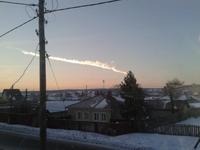-
Russian fireball largest ever detected by nuke monitoring organization
Infrasound has been used as part of the Comprehensive Nuclear Test Ban Treaty Organization’s (CTBTO) monitoring tools to detect atomic blasts since April 2001 when the first station came online in Germany. Infrasonic waves from the meteor that broke up over Russia’s Ural Mountains last week were the largest ever recorded by the CTBTO’s International Monitoring System.
-
-
Climate change as a national security issue
In a new report, Harvard researcher is pointing toward a new reason to worry about the effects of climate change — national security. During the next decade, the report concludes, climate change could have wide-reaching effects on everything from food, water, and energy supplies to critical infrastructure and economic security. “The imminent increase in extreme events will affect water availability, energy use, food distribution, and critical infrastructure — all elements of both domestic and international security,” the report’s author says.
-
-
Self-healing protective coating for concrete
Scientists are reporting development of what they describe as the first self-healing protective coating for cracks in concrete, the world’s most widely used building material. The coating is inexpensive and environmentally friendly.
-
-
U.S. responds to China’s cyberattacks with anti-theft trade strategy
The Obama administration yesterday (Wednesday) unveiled the details of a broad strategy to counter the systemic theft by Chinese government agencies of U.S. trade and technology and trade secrets. The administration’s plan calls for new diplomatic push to discourage intellectual property theft abroad and better coordination at home to help U.S. companies protect themselves.
-
-
Earthquake catastrophes and fatalities to rise in 21st century
Predicted population increases in this century can be expected to translate into more people dying from earthquakes. There will be more individual earthquakes with very large death tolls as well as more people dying during earthquakes than ever before, according to a new study.
-
-
Water managers can now consult new U.S. water evaporation maps
The amount of water available for people and ecosystems is the amount of annual precipitation — that is, snow or rain — minus the amount of annual evapotranspiration. Evapotranspiration itself is the amount of water lost to the atmosphere from the ground surface. Scientists map the long-term U.S. evapotranspiration rates for the first time.
-
-
U.S. weighing retaliatory measures against China for hacking campaign
As incontrovertible evidence emerged for the role of Chinese government in initiating and orchestrating the massive, sustained Chinese hacking campaign against U.S. private companies, government agencies, and critical infrastructure assets, the administration has intensified discussions of retaliatory measures the United States may take against China.
-
-
Spotting potential targets of nefarious e-mail attacks
The weakest link in many computer networks is a gullible human. With that in mind, computer science researchers want to figure out how to recognize potential targets of nefarious e-mails and put them on their guard.
-
-
The sobering reality of water security
Agriculture is one of the world’s most insatiable consumers of water. Yet, it is facing growing competition for water from cities, industry, and recreation at a time when demand for food is rising, and water is expected to become increasingly scarce.
-
-
Chinese government orchestrates cyberattacks on U.S.: experts
For more than a decade now, China has engaged in a sustained, systemic, and comprehensive campaign of cyber attacks against the United States. The Chinese government has enlisted China’s sprawling military and civilian intelligence services, with their armies of cyber-specialists, in a cyber-campaign aiming to achieve three goals: steal Western industrial secrets and give them to Chinese companies, so these companies could compete and weaken their Western rivals; hasten China’s march toward regional, then global, economic hegemony; achieve deep penetration of U.S. critical infrastructure in order to gain the ability to disrupt and manipulate American critical infrastructure – and paralyze it during times of crisis and conflict. A detailed 60-page study, to be released today , offers, for the first time, proof that the most sophisticated Chinese hacker groups, groups conducting the most threatening attacks on the United States, are affiliated with the headquarters of China’s military intelligence lead unit — PLA Unit 61398.
-
-
Novel technology to tackle global water challenges

The University of Alberta will unveil new technologies its researchers and students will use to replace inadequate water purification and monitoring equipment in remote communities in Canada and India.
-
-
Russia meteor a “once every 100 years” event

The meteor which disintegrated in the skies over Chelyabinsk, Russia, early Friday morning entered the atmosphere at about 40,000 mph (18 kilometers per second). The energy released by the impact was in the hundreds of kilotons.The meteor is the largest reported since 1908, when a meteor hit Tunguska, Siberia.
-
-
System to vaporize asteroids that threaten Earth

As an asteroid roughly half as large as a football field — and with energy equal to a large hydrogen bomb – flew by Earth on Friday, two California scientists unveiled their proposal for a system that could eliminate a threat of this size in an hour. The same system could destroy asteroids ten times larger than the one known as 2012 DA14 in about a year, with evaporation starting at a distance as far away as the Sun.
-
-
The ground is key to cleaner environment, water
While many people recognize that clean water and air are signs of a healthy ecosystem, most do not realize that a critical part of the environment is right beneath their feet. The ground plays an important role in maintaining a clean environment by serving as a natural water filtration and purification system.
-
-
Quantum cryptography to secure electric grid
Novel methods for controlling the electric grid are needed to accommodate new energy sources such as renewables whose availability can fluctuate on short time scales. This requires transmission of data to and from control centers; but for grid-control use, data must be both trustworthy and delivered without delays. The Los Alamos National Laboratory quantum cryptography team successfully completed the first-ever demonstration of securing control data for electric grids using quantum cryptography.
-
- All
- Regional
- Water
- Biometrics
- Borders/Immig
- Business
- Cybersecurity
- Detection
- Disasters
- Government
- Infrastructure
- International
- Public health
- Public Safety
- Communication interoperabillity
- Emergency services
- Emergency medical services
- Fire
- First response
- IEDs
- Law Enforcement
- Law Enforcement Technology
- Military technology
- Nonlethal weapons
- Nuclear weapons
- Personal protection equipment
- Police
- Notification /alert systems
- Situational awareness
- Weapons systems
- Sci-Tech
- Sector Reports
- Surveillance
- Transportation
Advertising & Marketing: advertise@newswirepubs.com
Editorial: editor@newswirepubs.com
General: info@newswirepubs.com
2010-2011 © News Wire Publications, LLC News Wire Publications, LLC
220 Old Country Road | Suite 200 | Mineola | New York | 11501
Permissions and Policies
Editorial: editor@newswirepubs.com
General: info@newswirepubs.com
2010-2011 © News Wire Publications, LLC News Wire Publications, LLC
220 Old Country Road | Suite 200 | Mineola | New York | 11501
Permissions and Policies
